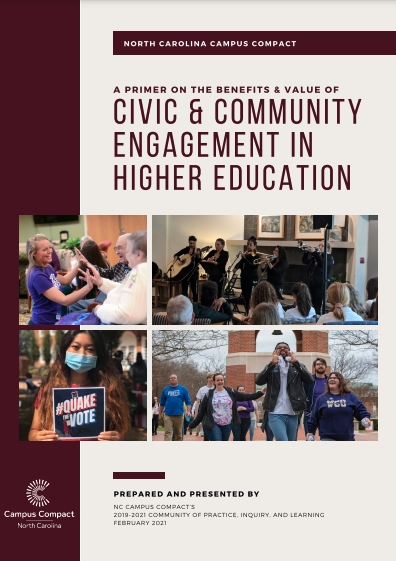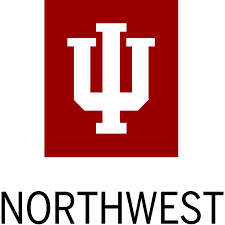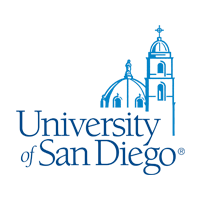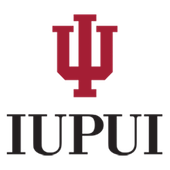Collaboratory’s Shining the Light series highlights the amazing work of our institutional partners and shares examples of community engagement and public service activities captured in Collaboratory.
Recognizing that community engagement is an integral strategy through which campuses contribute to and achieve the mission and goals of their institutions, this series is guided by the Benefits of Civic and Community Engagement Primer co-edited by Collaboratory’s own Kristin Medlin and published by our partners, North Carolina Campus Compact’s Community of Practice, Inquiry & Learning (COPIL).
The primer:
- Assembles evidence of how civic and community engagement (CCE), when done well, contributes to the overarching goals of higher education
- Highlights the range of CCE activities occurring in community-campus partnerships throughout the state of North Carolina
- Provides a tool to aid in deepening the practice of engagement, and
- Makes the case for investment in and commitment to CCE
This installment of Shining the Light features community engagement and public service activities done with and for individuals who are incarcerated.
Voter Awareness and Access for Citizens Impacted by the Criminal Legal System
The Think-Tank (comprised mainly of students who have taken DePaul’s Inside-Out courses) meets bi-weekly at Stateville. It discusses matters of law and policy that relate to the criminal legal system, incarcerated individuals, and their families and communities. In particular, we seek to educate and engage individuals with a felony conviction about their voting rights while incarcerated, so that they will be prepared to utilize those rights upon their release.
Inside Out Prison Exchange Program
The activity focuses on an educational program offered inside the Lake County Community Correctional Facility. Students in the program are a blended mix of incarcerated individuals and students enrolled in classes at Indiana University Northwest. The activity is of mutual benefit to both Lake County Community Corrections and Indiana University Northwest. Students, incarcerated women, and the instructor all grow intellectually, personally, and professionally because of the activity.
Content Development & Program Support for Advancing Carceral Justice and Youth Programs in STEM
At ReEvolution, students provided support to various aspects of the organization. Students contributed content to the organization’s newsletter which discussed the history of the prison industrial complex. Students also helped prepare and record content for the organization’s podcast. Students helped with social media outreach, and contributed to a re-entry resource guide. Students also helped with fundraising efforts.
East Los Angeles Immersion
Offered during the fall holiday weekend, this immersion experience connects USD students with Dolores Mission Parish in the Boyle Heights neighborhood of Los Angeles. In addition to assisting with the parish’s various outreach programs, the students stay in the homes of parishioners, learn about the founding and ongoing work of Homeboy Industries (a nationally known nonprofit agency designed to promote the rehabilitation of formerly incarcerated gang members) and engage in daily prayer and reflection. The immersion experiences offered by our department are designed to help participants go deeper in their faith and make an enduring commitment to social justice.
Future IDs Art and Future Planning Workshop at the Maricopa Reentry Center
With the Maricopa Re-Entry Center, AZ Department of Corrections is working to expand programs for parole violators and substance abusers, giving them a second chance. Deputy Warden Patricia Barnhart approached Associate Professor Sale inviting him to develop an arts pilot program. A group of self-selected ASU students and center residents participated in the social art project about individual stories of transformation and how those stories collectively can help reframe the narrative of re-entry.
The Path to Freedom
Path of Freedom is a mindfulness-based emotional intelligence (MBEI) model for at-risk and incarcerated youth and adult prisoners developed by Kate Crisp and Fleet Maull. The curriculum used in prisons includes training in: mindfulness meditation, emotional intelligence, communication, conflict resolution, and various resourcing and resiliency building skills. Participants develop greater self-awareness, improved impulse control, and greater social awareness which will give them a new positive vision for their lives.
Check Out Our Related Resources
Shining the Light: Voter Engagement
Shining the Light: Engaging with the LGBTQ+ Community
Shining the Light: Project and Community-based Experiential Learning
Want to learn more about Collaboratory?
Email info@cecollaboratory.com to learn more about how to leverage Collaboratory to tell your institution’s story of engagement.








